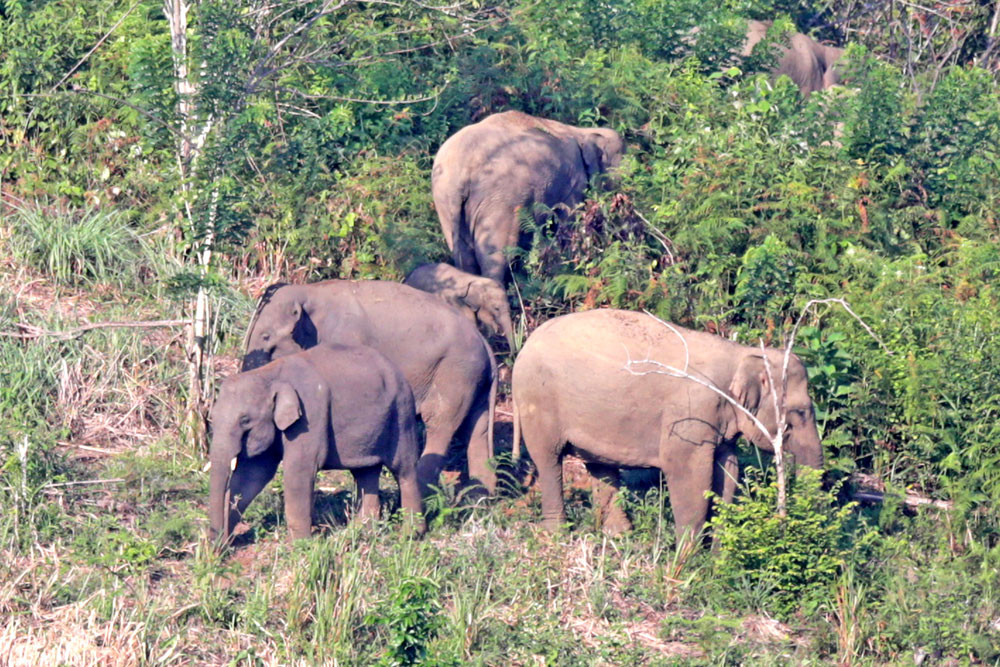Popular Reads
Top Results
Can't find what you're looking for?
View all search resultsPopular Reads
Top Results
Can't find what you're looking for?
View all search resultsBali, elephants, and the spirit of ‘pawongan’
Zoos as a model of conservation, at least in Indonesia, is that, like local conservation programs, they too are chronically under-resourced and so cannot mimic the herd social structure that elephants need to thrive and survive.
Change text size
Gift Premium Articles
to Anyone
T
he Sumatran elephant (Elephas maximus sumatrensis) is a critically endangered species. With less than 800 individuals remaining in the wild, the Indonesian Directorate General of Nature Protection and Conservation (PHPA) has concluded that small, fragmented and rapidly declining protected areas alone cannot guarantee viable populations or, in fact, the survival of the iconic species.
Over the last 25 years, the Sumatran elephant has lost more than 70 percent of both its habitat and population. Projections are grim. At the current rate of tropical forest destruction, the species will be extinct in the jungles of Sumatra by 2030. With few externally funded projects addressing conservation, a highly successful alternative model has emerged in Bali. Unfortunately, this too has become a victim of the COVID-19 pandemic.
Experts agree that protecting and expanding habitats for wildlife is the best “theoretical” option for the preservation of any endangered species. However, because of climate and land use changes on Indonesia’s largest island, Sumatra, combined with ever increasing human population pressures, the ideal habitat for these gentle giants effectively no longer exists.
Likewise, the problem with zoos as a model of conservation, at least in Indonesia, is that, like local conservation programs, they too are chronically under-resourced and so cannot mimic the herd social structure that elephants need to thrive and survive, let alone provide expensive animal husbandry and veterinary support.
The Mason Elephant Park is Bali’s only dedicated elephant rescue facility. It supports the island’s largest Sumatran elephant herd comprising some 30 animals. Twenty-four animals have been rescued (with official permission) from camps where elephants, that were at risk of being killed for encroachment on cultivated land, were held in appalling conditions. Significantly, six baby elephants have been born naturally in Bali. Notably, the Park was the first of its kind to receive gold accreditation from Asian Captive Elephants Standards (ACES), an animal welfare organization that provides parks with the methodology to ensure elephants have proper care through a rigorous assessment process, conducted by an experienced team of specialists, veterinarians, researchers, and conservationists, not to mention over half of the Park’s 250 employees, who are solely engaged in looking after the herd.
Like many businesses on “the island of the gods” the Park is drawing on Bali’s resilient culture to inspire them not to give up during the current crisis. Park owner, Ibu (Mrs) Yanie Mason, is originally from the village of Legian near the famed Kuta beach. She says, “Here in Bali, we believe in the spirit of pawongan. This is about helping each other in good times and bad. Balinese know that, if they practice pawongan, then they will have a harmonious life, and every difficulty will be overcome.”
What Ibu Yanie is referring to is Tri Hita Karana or the Balinese philosophy of life. It basically covers three relationships: the individual and God (Parhyangan), people with each other (pawongan) and human society and nature (palemahan). According to Ibu Yanie, all three of these relationships must be maintained to achieve harmony and happiness. For Ibu Yanie, her husband Nigel, their two sons and everyone else involved in the Park, palemahan is a constant reminder that we are not alone on this planet but are custodians entrusted with a sacred responsibility.
Essentially this means that, as nature provides for human beings, human beings must in turn preserve and protect nature. Ibu Yanie says that the Tri Hita Karana philosophy has “COVID-proofed” the mindset of her fellow Balinese during the darkest days of this seemingly endless crisis.
Unfortunately, after nearly two years of shutdowns, Bali’s tourism sector has been devastated. The Park is now facing the critical situation of not being able to look after the herd for much longer. Save Bali Elephants is a registered not-for-profit yayasan, or special purpose foundation, set up to generate the emergency funds needed to ensure the herd makes it through the global pandemic. Every day, each one of the Park’s elephants requires around 250 kilograms of food. It costs the Mason family more than US$30,000 a month to feed and properly look after all the elephants in their care.
As Ibu Yanie says, “100 percent of every donation will go directly toward looking after the precious Bali herd. This includes a consistent well-balanced and healthy diet with fresh water, nutritional supplements and veterinarian support, as well as the cost of transporting and distributing massive amounts of food, together with staff wages for those directly involved in caring for the elephants.”
Clearly, Save Bali Elephants is adhering to the pawongan aspect of Tri Hita Karana as well—or concern for each other. This is because ordinary Balinese employed in ventures like the Mason Elephant Park are suffering just as much as Bali’s beloved elephant herd.
***
The writer is a researcher with the Humanitarian and Development Research Initiative (HADRI) Western Sydney University. He has personally donated to Yayasan Save Bali Elephants. If you would like to help, please go to https://savebalielephants.org/











